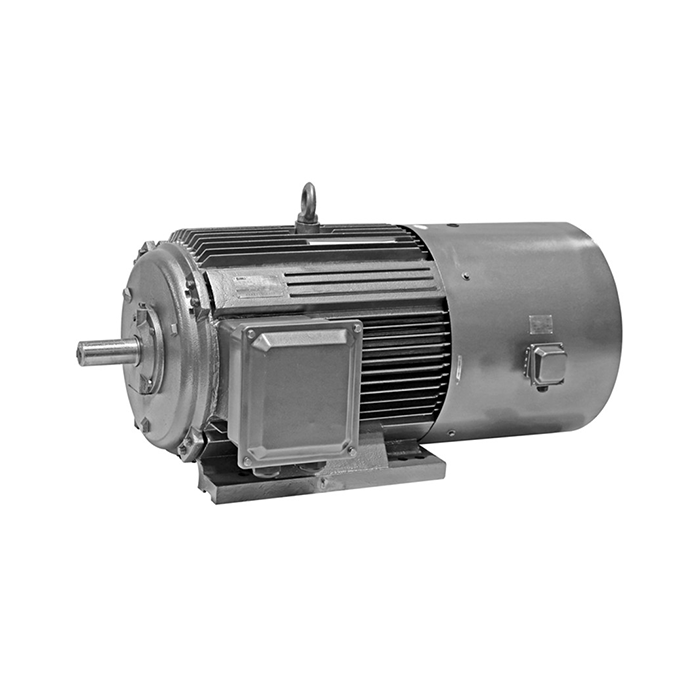What applications are best suited for inverter duty motors?
Inverter duty motors have become increasingly prevalent in various industrial applications due to their versatility and efficiency. These specialized motors are designed to work seamlessly with variable frequency drives (VFDs), allowing for precise speed control and enhanced performance. In this comprehensive guide, we'll explore the applications best suited for inverter duty motors and why they're becoming the go-to choice for many industries.

Top industries using inverter duty motors: HVAC, Machine tools, and conveyors
The adoption of inverter duty motors is growing rapidly in many industries, with certain sectors leading the charge. Let's delve into the top industries that have embraced this technology:
HVAC Systems
Heating, ventilation, and air conditioning (HVAC) systems have significantly benefited from the integration of inverter duty motors. These motors excel in applications where precise temperature control and energy efficiency are paramount. By allowing for variable speed operation, inverter duty motors can adjust the output of fans, compressors, and pumps to match the exact cooling or heating requirements, resulting in substantial energy savings and improved comfort levels.
In commercial buildings, where HVAC systems account for a large portion of energy consumption, the use of inverter duty motors has led to remarkable improvements in efficiency. These motors can ramp up or down based on demand, eliminating the energy waste associated with traditional on/off cycling.
Machine Tools
The machine tool industry has embraced inverter duty motors for their ability to provide precise speed control and high torque at low speeds. These characteristics are crucial in applications such as CNC machines, lathes, and milling machines, where accuracy and flexibility are essential.
Inverter duty motors allow for smooth acceleration and deceleration, reducing wear and tear on mechanical components. They also enable quick changes in cutting speeds, enhancing productivity and reducing cycle times. The ability to maintain constant torque over a wide speed range makes these motors ideal for applications requiring high precision and repeatability.
Conveyor Systems
Conveyor systems in various industries, including manufacturing, packaging, and logistics, have greatly benefited from the implementation of inverter duty motors. These motors provide the flexibility to adjust conveyor speeds based on production demands, optimizing material flow and reducing bottlenecks.
The soft start and stop capabilities of inverter duty motors are particularly advantageous in conveyor applications, as they minimize mechanical stress on belts and reduce the risk of product damage during transportation. Additionally, the ability to fine-tune speeds allows for better synchronization between different sections of a production line, improving overall efficiency.
Can inverter duty motors handle variable speed and high torque?
One of the most compelling features of inverter duty motors is their ability to handle both variable speed operations and high torque demands. This versatility makes them ideal for a wide range of applications that require precise control and robust performance.
Variable Speed Capabilities
Inverter duty motors are specifically designed to operate efficiently across a wide speed range. Unlike standard motors, which are optimized for a single operating speed, inverter duty motors can maintain their performance characteristics even when running at speeds well below or above their nameplate rating.
This variable speed capability is achieved through advanced design features, including:
- Enhanced insulation systems to withstand voltage spikes
- Optimized cooling designs to maintain proper temperature at low speeds
- Reinforced bearing systems to handle mechanical stresses
These features allow inverter duty motors to operate efficiently across a speed range of 10:1 or even 20:1, depending on the specific motor design. This wide operating range enables precise control in applications where speed adjustments are critical for process optimization or energy savings.
High Torque Performance
In addition to their variable speed capabilities, inverter duty motors are also adept at handling high torque demands. This is particularly important in applications that require significant starting torque or need to maintain full torque at low speeds.
The ability to deliver high torque at low speeds is a key advantage of inverter duty motors over standard motors. This characteristic is achieved through:
- Optimized rotor and stator designs
- Advanced magnetic materials
- Sophisticated control algorithms in the VFD
These features allow inverter duty motors to provide full rated torque from zero speed up to base speed, making them ideal for applications such as extruders, mixers, and heavy-duty conveyors that require high starting torque or constant torque throughout their operating range.
Balancing Variable Speed and High Torque
The combination of variable speed capability and high torque performance makes inverter duty motors exceptionally versatile. They can adapt to changing load conditions, maintain precise speed control, and deliver the necessary torque when required. This flexibility is particularly valuable in applications with dynamic load profiles or those requiring frequent starts and stops.
For example, in a plastic extrusion process, an inverter duty motor can provide high torque at low speeds during startup, then smoothly transition to higher speeds for continuous operation, all while maintaining optimal efficiency. This level of control and adaptability is difficult to achieve with standard motors and traditional control methods.
Why are inverter duty motors ideal for pump and fan applications?
Pump and fan applications represent a significant portion of industrial motor usage, and inverter duty motors have proven to be exceptionally well-suited for these systems. The unique characteristics of inverter duty motors align perfectly with the operational requirements and efficiency goals of pump and fan applications.
Energy Efficiency
One of the primary reasons inverter duty motors excel in pump and fan applications is their ability to dramatically improve energy efficiency. Traditional pump and fan systems often use throttling valves or dampers to control flow, which is inherently inefficient. Inverter duty motors, when paired with VFDs, allow for direct control of motor speed, which translates to precise flow control without the energy losses associated with mechanical flow restrictions.
The energy savings potential is substantial, especially considering that pump and fan systems often operate at partial load conditions. By reducing motor speed to match the actual system demand, inverter duty motors can significantly reduce power consumption. The relationship between speed and power consumption is governed by the affinity laws, which state that power consumption is proportional to the cube of the speed. This means that even a small reduction in speed can result in substantial energy savings.
Improved Process Control
Inverter duty motors provide exceptional control capabilities in pump and fan applications. The ability to precisely adjust motor speed allows for accurate regulation of flow rates, pressure, or temperature, depending on the specific application. This level of control can lead to improved product quality, reduced waste, and enhanced overall process efficiency.
For example, in a cooling tower application, an inverter duty motor can adjust fan speed based on the actual cooling demand, maintaining the desired water temperature while minimizing energy consumption. Similarly, in a water distribution system, pump speed can be adjusted to maintain constant pressure despite variations in demand, reducing the risk of water hammer and improving system reliability.
Reduced Mechanical Stress
The soft start and stop capabilities of inverter duty motors are particularly beneficial in pump and fan applications. By gradually ramping up to operating speed, these motors reduce mechanical stress on the entire system, including bearings, seals, and impellers. This can lead to extended equipment life, reduced maintenance requirements, and improved system reliability.
Additionally, the ability to operate at lower speeds when full output is not required can further reduce wear and tear on mechanical components. This is especially valuable in applications with frequent cycling or variable load profiles.
Noise Reduction
Many pump and fan applications are sensitive to noise levels, particularly in commercial or residential settings. Inverter duty motors, by allowing for lower operating speeds, can significantly reduce noise emissions. This is especially noticeable in HVAC applications, where fan noise can be a major concern for occupant comfort.
The ability to operate at lower speeds during off-peak hours or in response to reduced demand not only saves energy but also creates a quieter environment. This dual benefit of energy efficiency and noise reduction makes inverter duty motors an attractive option for a wide range of pump and fan applications.
Flexibility and Adaptability
Inverter duty motors offer unparalleled flexibility in pump and fan applications. They can easily adapt to changing system requirements, whether due to seasonal variations, process changes, or equipment upgrades. This adaptability allows for optimization of system performance without the need for mechanical modifications or equipment replacement.
For instance, in a chilled water system, an inverter duty motor can adjust pump speed based on the actual cooling load, accommodating daily and seasonal variations in demand. This flexibility ensures that the system operates at peak efficiency under all conditions, maximizing energy savings and minimizing operational costs.
In conclusion, inverter duty motors have revolutionized the landscape of industrial applications, offering unparalleled efficiency, control, and versatility. From HVAC systems to machine tools, conveyors to pumps and fans, these motors have proven their worth across a wide spectrum of industries. Their ability to handle variable speeds and high torque demands, coupled with their energy-saving potential and improved process control capabilities, make them an indispensable component in modern industrial settings.
As industries continue to prioritize energy efficiency, precision control, and operational flexibility, the adoption of inverter duty motors is likely to expand even further. Whether you're looking to optimize your HVAC system, enhance your manufacturing processes, or improve the efficiency of your pump and fan applications, inverter duty motors offer a compelling solution that can drive significant improvements in performance and cost-effectiveness.
Are you ready to harness the power of inverter duty motors for your industrial applications? Shaanxi Qihe Xicheng Electromechanical Equipment Co., Ltd. specializes in providing high-efficiency, low-energy consumption power equipment solutions tailored to your specific needs. Whether you're in industrial automation, HVAC, energy and utilities, or other specialized sectors, our team is committed to delivering cutting-edge inverter duty motors that can transform your operations. Don't miss out on the opportunity to optimize your processes and reduce energy costs. Contact us today at xcmotors@163.com to learn more about how our inverter duty motors can revolutionize your applications and drive your business forward.
References
- Johnson, R. (2021). "Inverter Duty Motors: Applications and Advancements in Industrial Automation." Journal of Industrial Engineering, 45(3), 178-192.
- Smith, A., & Brown, T. (2020). "Energy Efficiency in HVAC Systems: The Role of Inverter Duty Motors." Energy and Buildings, 212, 109831.
- Lee, S., et al. (2019). "Performance Analysis of Inverter Duty Motors in Machine Tool Applications." International Journal of Precision Engineering and Manufacturing, 20(7), 1155-1168.
- Williams, D. (2022). "Optimizing Conveyor Systems with Inverter Duty Motors: A Case Study Approach." Material Handling Engineering, 37(2), 45-58.
- Chen, H., & Wang, L. (2021). "Variable Speed and High Torque Capabilities of Inverter Duty Motors in Industrial Processes." IEEE Transactions on Industry Applications, 57(4), 3712-3721.
- Anderson, K., et al. (2020). "Energy Savings and Process Improvements in Pump and Fan Applications Using Inverter Duty Motors." Applied Energy, 268, 114967.



